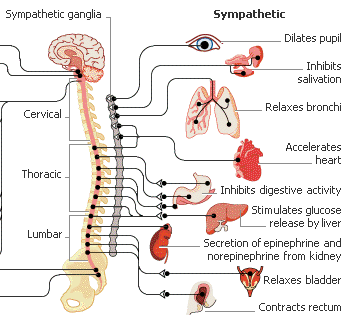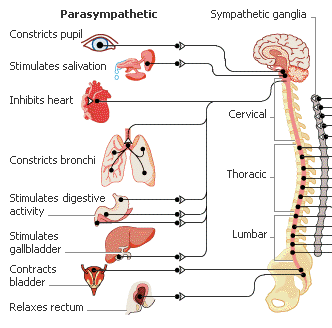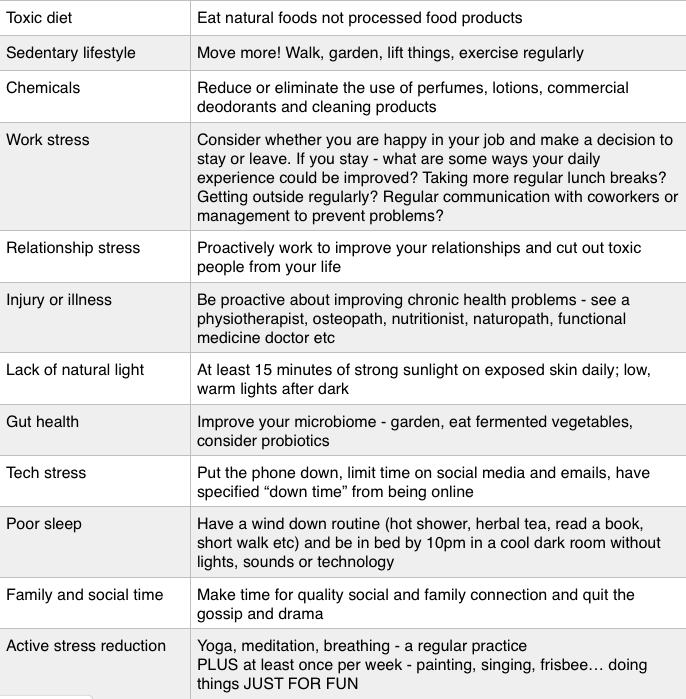Chronic stress has physical effects on our bodies.
Stress causes activation of the sympathetic nervous system.

Symptoms include:
Dry mouth
Shallow or difficulty breathing
Rapid heart beat
Poor digestion, IBS
Increased blood sugar
Restlessness, anxiety, poor sleep
Constipation
Plus a weakened immune system, increased inflammation, increased muscle tension, decreased libido, fatigue and even night sweats.
Think of it like this – you are under attack and need to escape pronto. Your sympathetic nervous system gives you the best chance possible by opening your pupils to let light in so you can see better, slowing down any system not required right this second – like the digestive, urinary and reproductive systems, and sending blood flow instead to the ‘needed right now’ areas of heart and muscles.
So how does this affect our weight?
It is on a chemical level that we experience changes that affect our ability to lose or gain weight. The fight or flight response triggers a release of adrenaline and cortisol, hormones that trigger pathways of change in the body. When we need to escape we require a boost of energy to our muscles, so our body converts glycogen in the liver to glucose and puts this sugar into our blood stream so that we can use it. We aren’t designed to have a lot of sugar sitting in our blood stream so our pancreas releases insulin – a hormone that drives the glucose out of the blood and into the cells. No good if you need that energy to survive. So our sympathetic nervous system, in trying to save our lives, not only increases our blood sugar but also suppresses our response to insulin, meaning the sugar can stay in our blood to be put to use if need be. (If you’re thinking this sounds a lot like type 2 diabetes – you are right.) We go into survival mode and get a mobilisation of fats into the blood stream, more storage of abdominal fat, reduced sensitivity to leptin (the hormone that tells you when you’re full), increased hunger… basically a recipe for weight gain!

When our lives were simpler and our stressors came and went, our body would naturally slip back into the parasympathetic nervous system and away from this fight or flight response. Unfortunately nowadays our sources of stress are ever present. Work stress, 24/7 messages and emails, lack of true family and social support networks, feelings of isolation, sedentary lifestyle, poor sleep, not enough natural light and exposure to bright unnatural lights particularly after dark, a toxic diet, poor gut health, exposure to more chemicals than our bodies have ever seen in the history of human beings, and overall a lost sense of purpose and connection to nature and our place on earth! (Phew!) That might be starting to sound a bit hippy, but even looking back 2 or 3 generations it is really clear to see how fast our world, our technology and our societal structure is changing and just how much we have deviated from our natural way of life. The point of this story is that we are stuck in a state of stress and that this has real physical consequences on a chemical and cellular level in our bodies.
Considering the high prevalence of digestive disorders and irritable bowel syndrome, autoimmune diseases like thyroid dysfunction, reproductive disorders and chronic inflammatory diseases, it is easy to see how stress plays a part in all of these disease processes.
 The parasympathetic nervous system
The parasympathetic nervous system
“Feed and breed”, “rest and digest”, call it what you want but this nervous system is responsible for most of the good things in life! Without it we are unable to properly relax, digest food and make babies – i.e. it is responsible for the survival of our species!
There’s an old theory that you only have so many heart beats, so if you can slow down your heart rate – you’ll live longer! This holds some truth if we look at the range of heart rates (beats per minute) and life expectancies of mammals:

Mouse
HR 300-800 ppm / Life expectancy 1-3 years
 Elephant
Elephant
HR 30bpm / Life expectancy 50-70 years
Switching ourselves back to relax mode

First we need to recognise the causes of stress as listed above and do our best to address all of them. Now there may be one significant cause of stress in your life that by eliminating that you are able to have a drastic effect on your overall health. However often there’s a bit more work to do than that, and to achieve optimal health, we need to find balance across the board. Here’s a summary of the causes of stress and how you can reduce stress overall:

So remember, stress is not necessarily what we think it is. We don’t need to be experiencing a major life crisis to be experiencing high levels of stress and seeing real physical effects on our health. Its time to be proactive in reducing stress.
Kelly Moriarty

